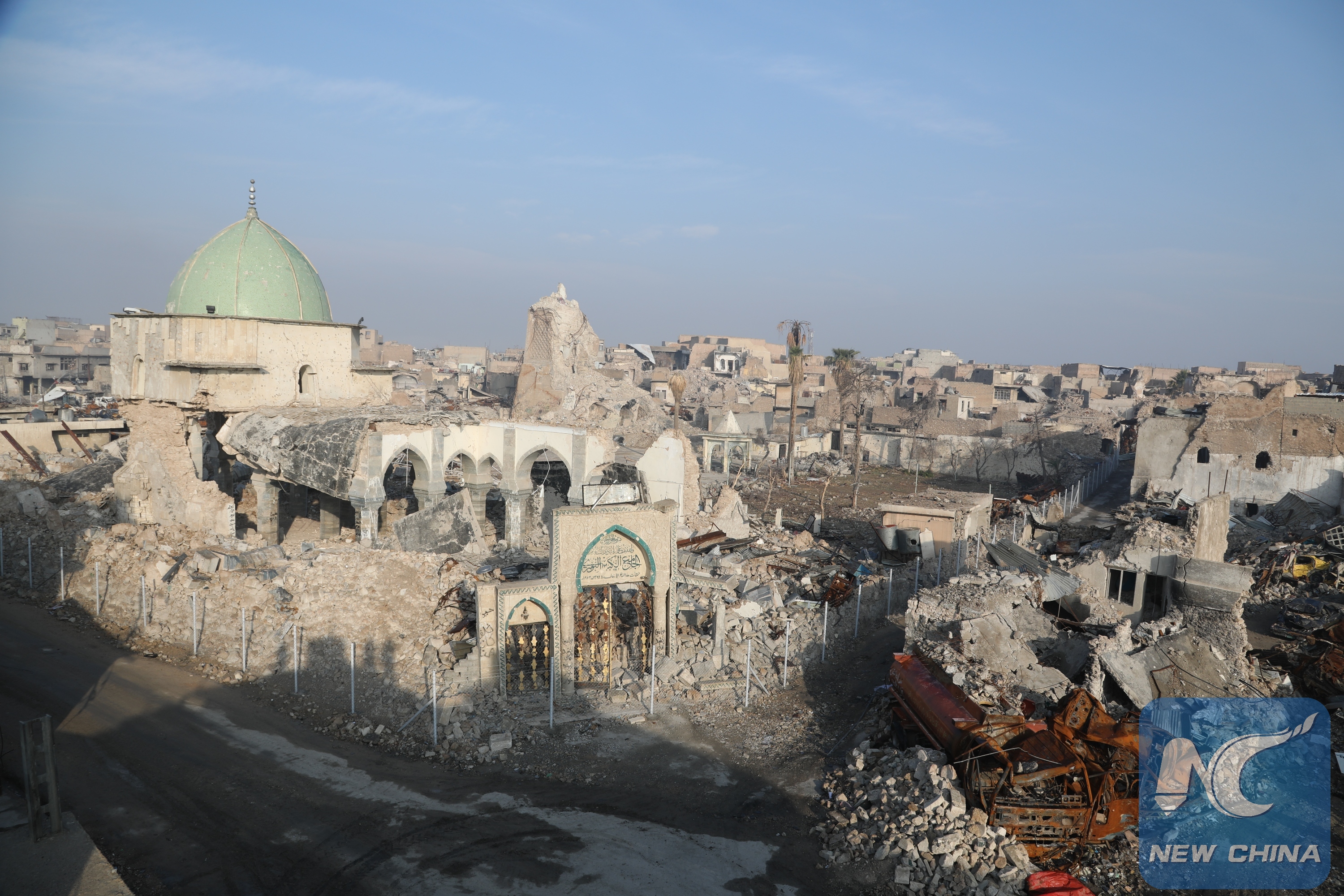
An Iraqi cleans the ruins of collapsed buildings in Mosul, Iraq, on Jan. 4, 2018. Mosul was taken control by the Islamic State in June 2014 and suffered tremendous damage during the fight between Iraqi army and extremists, and was finally liberated by Iraqi army in July 2017. (Xinhua/Khalil Dawood)
by Jamal Hashim
BAGHDAD, March 20 (Xinhua) -- At sunset of a beautiful spring day, the thoroughfare of Mansour neighborhood in western Baghdad, the city center, was crowded with people as usual.
They looked as usual on the day marking the 15th anniversary of the invasion of Iraq by the U.S.-led coalition on March 20, 2003 to topple its leader Saddam Hussein, promising peace, freedom and democracy for Iraqis.
However, they had much to say. Most of them expressed their disappointment as the invasion turned their lives upside down and made them pay a high price.x Kareem Yousif, 58, a shop owner at the thoroughfare, told Xinhua that he was happy when the war broke out and toppled Hussein, who led his country into three wars and 13 years of severe UN sanctions that destroyed Iraq's economy and claimed the lives of hundreds of thousands of Iraqis.
"Fifteen years ago, I used to say let's have a new beginning after Saddam Hussein fell down. But now it is only the start of my people's misery," Yousif said.
"We have suffered under Saddam, but the suffering after the war was much larger. The Americans brought corrupt politicians and empowered sectarian and ethnic parties that yield bloody sectarian strife," Yousif said.
"The Americans and those who came with them are much worse than Saddam," Yousif said.
In 2003, acting upon false intelligence and the preemptive strike doctrine, the U.S.-led Operation Iraqi Freedom, a war fought to topple Hussein's government broke out, marking the beginning of the U.S. military deployment in the country.
After seven years and five months, Washington withdrew its troops, leaving the country to suffer worsening poverty, political rivalry, religious conflicts and terrorist attacks.
At an ice cream shop, a group of teenage girls were sitting at a table giggling and chatting. One of them, Maha Hassan, wished that the invasion had never occurred.
"Was it the only way to change Saddam Hussien's regime? Did we have to pay such a high price of deaths and misery?" she asked, referring to thousands of Iraqi families who had lost one or more of their beloved sons, killed either by the U.S. forces or by the subsequent chaos and sectarian strife.
"Nothing will ever justify the costs that we paid during the past 15 years," said the girl who lost her 12-year brother in a car bombing in 2010.

The ruins of al-Nuri Mosque are seen in Mosul, Iraq, on Jan. 4, 2018. Mosul was taken control by the Islamic State in June 2014 and suffered tremendous damage during the fight between Iraqi army and extremists, and was finally liberated by Iraqi army in July 2017. (Xinhua/Khalil Dawood)
Maher Abbas, a 47-year-old lawyer who was jostling with his family on the sidewalk of the thoroughfare, said that those Iraqis who had celebrated the occupation are now disappointed after they realized that what they had thought to be hope was only illusion and that the Americans' promises were only a deception.
"The idea was tempting: to replace dictatorship, tyranny and tragedies of UN sanctions with prosperity, freedom and democracy. But the question is who would make the dream come true?" Abbas wondered.
"Today, 15 years on from the invasion the situation is not what those celebrants hoped and expected, as they realize that foreigners don't care the fate of our country, except to the extent that serves their interests and achieves their goals," Abbas answered.
Mazin Mohammed, a 43-year-old teacher, told Xinhua that "the real losers after all these years appeared to be the poor people of Iraq, who suffer from mass killings, terrorism, poverty, unemployment and corruption, while the country's wealth was concentrated in the hands of a few people who supported the occupation."
Ass'ad Abdullah, a 33-year-old engineer who was spending time with his friend at the thoroughfare, told Xinhua that after 15 years of devastation and bloodshed, Iraq has only got "a failed state with a false democracy," but he still thought that there is hope for a better future after the defeat of Islamic State (IS) militant group.
"We need to unite our people as we did, when all Iraqis -- Shiites, Sunnis, Kurds, Muslims and non-Muslims -- together fought back Daesh (IS group) and defeated them," he said.
"I can say that there could be hope for a new beginning to build our country if we together fight the corrupt people whether by elections or by massive demonstrations," Abdullah added.

